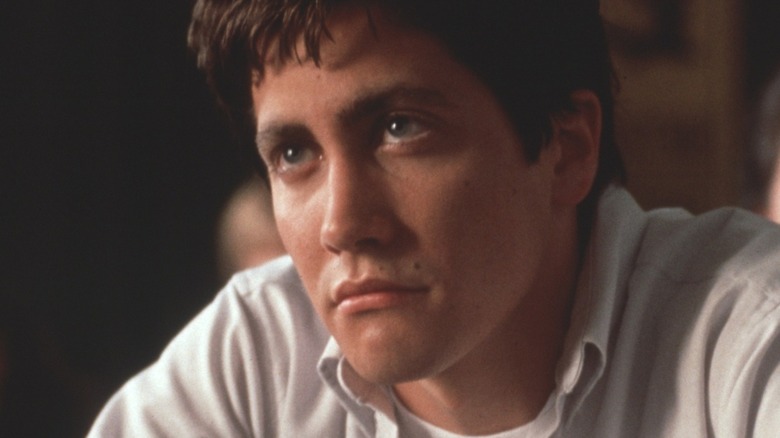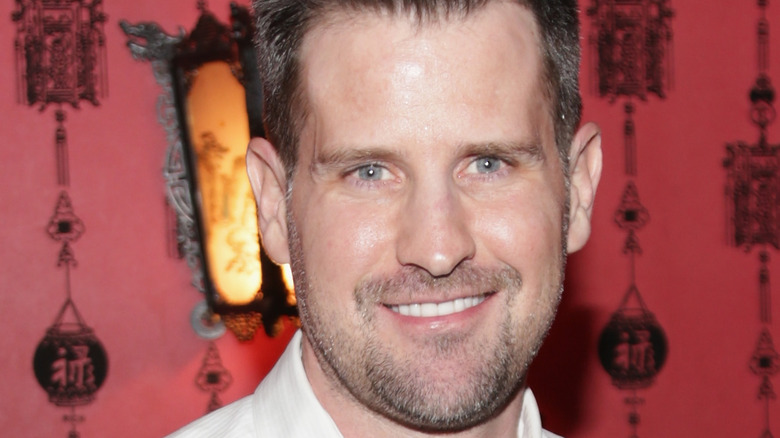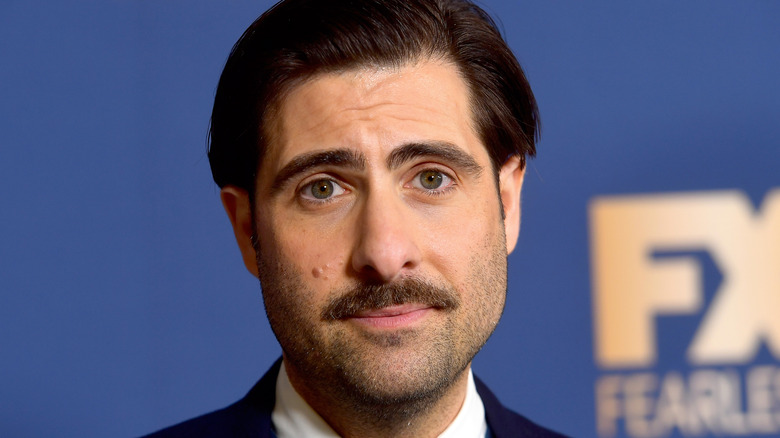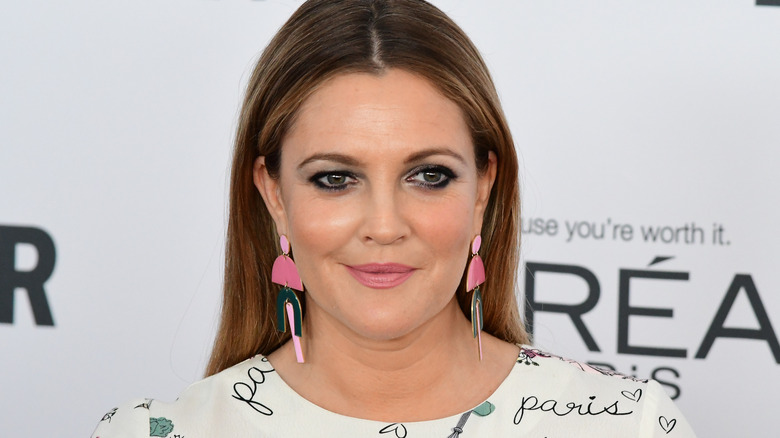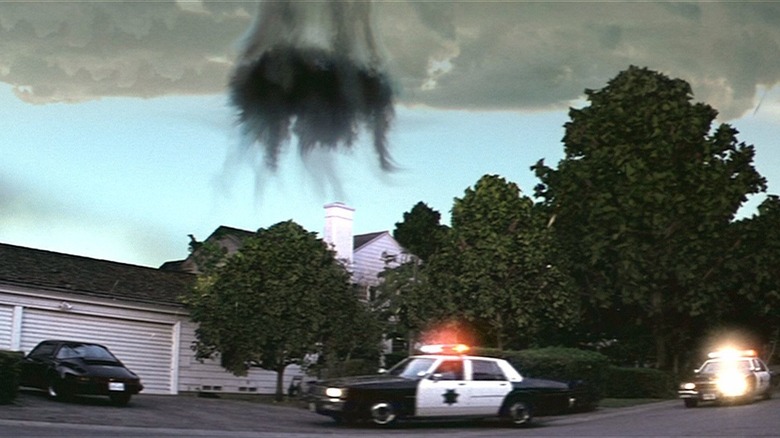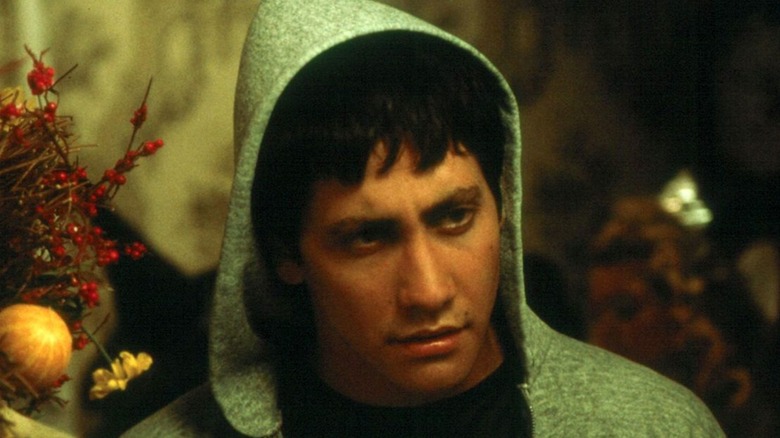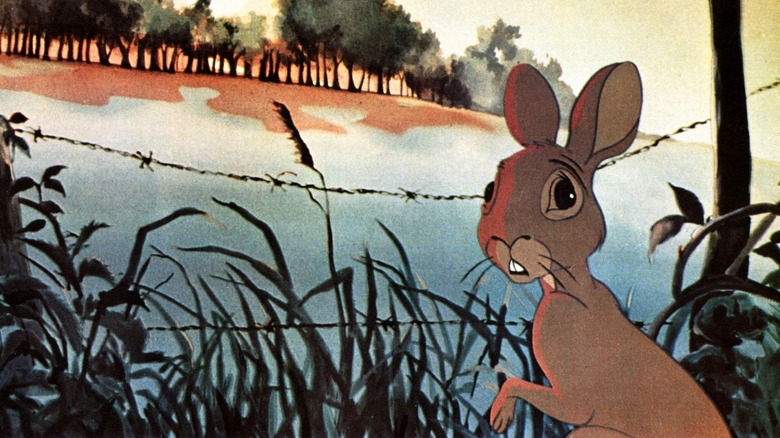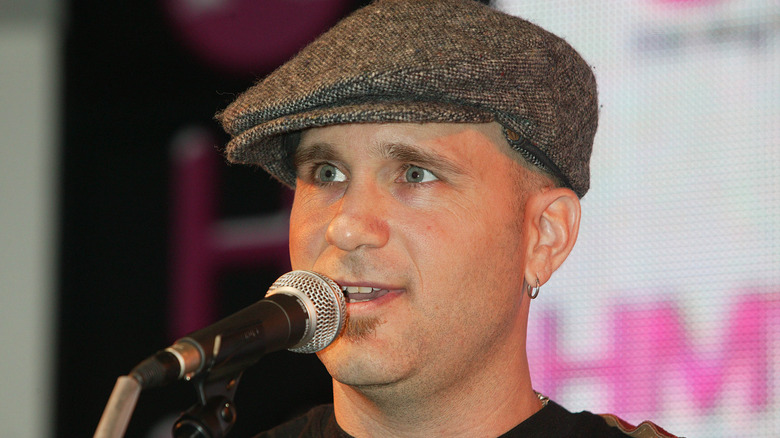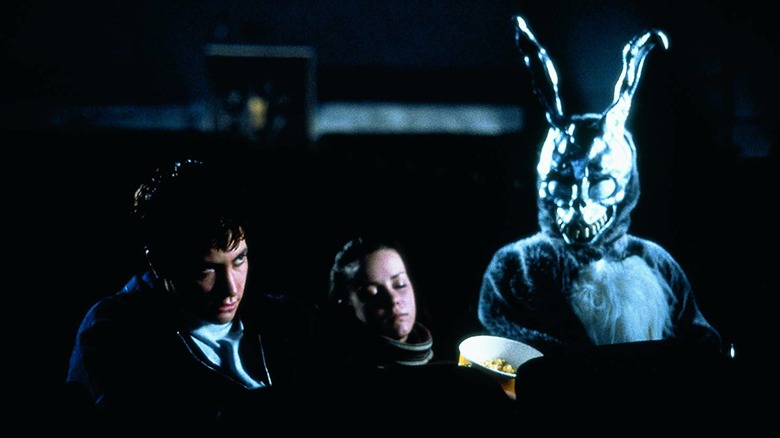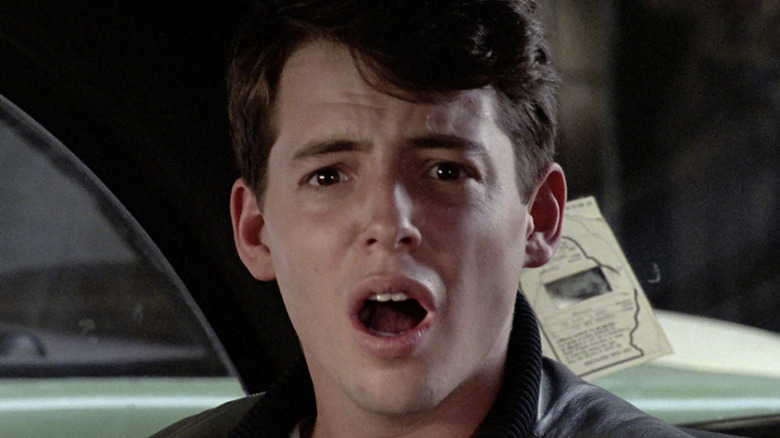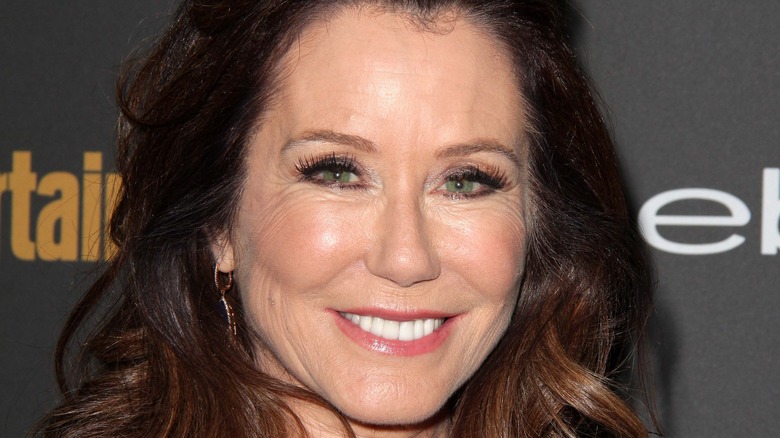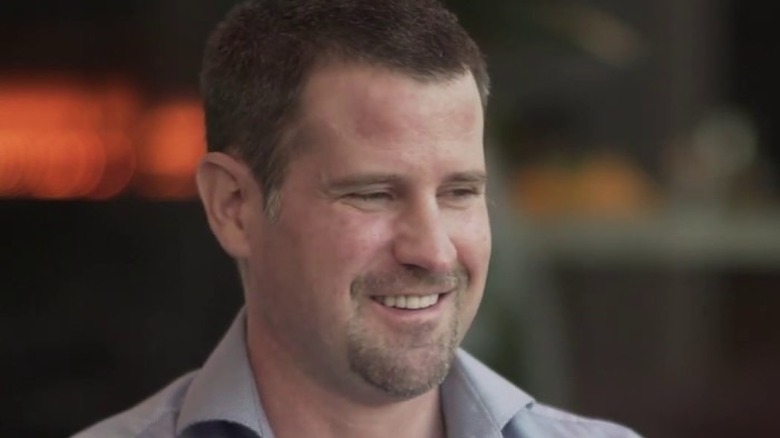The Untold Truth Of Donnie Darko
Jake Gyllenhaal is a storied actor, known for his numerous roles on the screen and stage. But his career did not begin in earnest until his breakthrough performance in Richard Kelly's 2001 psychological thriller meets coming-of-age drama "Donnie Darko." While it was a box office bomb, the film soon became a cult favorite remembered for much more than starting a famous actor's career.
This dark, inscrutable film begins with a jet engine crashing into the house of Donnie (Jake Gyllenhaal), who then dreams of a man dressed in a bunny suit telling him that the world is going to end in 28 days. He wakes up to find that he has sleepwalked outside and there's also a gaping hole where his bedroom used to be. As he navigates through the typical stresses of being an awkward anti-social teen in high school, Donnie deals with recurring visions of the impending apocalypse. Full of chilling, memorable imagery and great performances, "Donnie Darko" has rightfully earned its place as a cult classic. Some movies are just too weird to die.
The process of making "Donnie Darko" was almost as surreal and strange as the movie itself. From a series of happy accidents that led to the film being financed to a controversial director's cut getting released three years after the theatrical release, this is the untold truth of "Donnie Darko."
Director Richard Kelly was only 24 when he made Donnie Darko
Not many filmmakers get the opportunity to direct a major motion picture right out of film school. Even fewer can make something that goes on to be as influential as "Donnie Darko" in their whole career, let alone in their early 20s. But believe it or not, "Donnie Darko" director Richard Kelly was only 24 when he successfully pitched, cast, and shot the movie.
In 1998, just after graduating from USC, 23-year-old Kelly began writing "Donnie Darko." In the ensuing years, he took up a job an assistant at a post-production company while shopping the script around, "making cappuccinos for Madonna, trying to impress her," as he noted to The Ringer in an oral history of "Donnie Darko."
Kelly landed a big agent with his script and throughout the development process, he was insistent that he be the one to direct even though the now 24-year-old had never directed a feature before. In a 2017 interview with Filmmaker Magazine, Kelly explained, "I was very stubbornly possessive over [the script.] I wouldn't relinquish control and I wouldn't sell it to anyone or allow anyone else to direct it. I was fiercely protective of it." Considering how parts of "Donnie Darko" barely make sense after Kelly directed it, it surely would have been a disaster in anyone else's hands.
Jason Schwartzman was almost Donnie Darko
It's almost impossible to imagine Donnie Darko played by anyone other than Jake Gyllenhaal. But his involvement was far from inevitable, since there was another actor originally cast in the part. In 2001, Jason Schwartzman was coming off of his own breakout role in Wes Anderson's "Rushmore" and the plan was for him to play Donnie in Kelly's debut.
In fact, Richard Kelly only got "Donnie Darko" greenlit once Schwartzman was attached to the project. However, Schwartzman had to drop out at the last minute due to scheduling conflicts. Kelly doesn't shy away from giving the actor credit in helping to get the film made. In a 20-year retrospective interview with GamesRadar+, Kelly noted, "I don't think I'd have a career if it weren't for Jason and his support. I think Jake [Gyllenhaal] would say the same."
Schwartzman's last-minute withdrawal from the project ultimately led Kelly to making Gyllenhaal his Donnie. Not only did his departure make way for Gyllenhaal to take the role, but it was also thanks to Schwartzman that the actor and director met in the first place. Schwartzman's agent connected Kelly with Drew Barrymore, who became the "godmother" of "Donnie Darko" and it was in her office that Kelly first met Gyllenhaal. The writer-director described their first interaction to GamesRadar+, "Within 30 seconds, it was clear to me that he was the right actor. It was a gut intuition that he was the one."
The movie almost was a straight to video release until Drew Barrymore saved it
Jason Schwartzman wasn't the only actor whose involvement was paramount to "Donnie Darko" getting made. In fact, Drew Barrymore is arguably the reason that the movie happened at all. It all began when Schwartzman's agent sent Kelly's script to Nancy Juvonen, Barrymore's producing partner, who shared it with the "Charlie's Angels" star. Barrymore quickly signed on to produce the film and play English teacher Karen Pomeroy.
In a 2001 interview about "Donnie Darko," Barrymore talked about trusting Kelly because of his brilliant script, saying, "I was so excited to work under his direction and try and do anything I could to enable the movie getting made."
Ultimately, it wasn't just Barrymore's name in the credits that helped sell "Donnie Darko;" she actually had a hand in getting the movie distributed. Initially, "Donnie Darko" was doomed for a home video release, as Kelly explained to The Ringer that the film's distributor Newmarket Films wasn't interested in a theatrical release but the company changed their tune after Barrymore pleaded with them. According to Forbes, the actress stepped in directly to help put the movie out in a limited number of theaters through her production company Flower Films.
While ultimately, the movie wasn't a smash hit, "Donnie Darko" would have inevitably been forgotten if it had just been relegated to home video. Thankfully, that theatrical release — however limited it was — allowed for the film to get some word-of-mouth buzz that helped turn it into a cult classic.
Donnie Darko's unfortunate release timing led to its box office bust
Although it got generally positive reviews from critics upon release (via Metacritic), "Donnie Darko" didn't light up the box office. The movie only made a measly $110,000 in its opening weekend, and went on to barely crack half a million at the U.S. box office by the end of its run (via Box Office Mojo). Even for a movie with a relatively small budget — roughly $4.5 million according to producer Adam Fields — this performance wasn't nearly enough to earn the movie's money back. It wasn't even close. But there were a number of factors outside of anyone's control that played a big part in that failure.
"Donnie Darko" bombed at the box office for a handful of reasons, but the most significant is that the movie happened to come out right after 9/11. Scheduled for release in October 2001, the promotional materials for "Donnie Darko ” prominently featured a plane crashing into a building. This imagery being inextricably tied to the movie resulted in "Donnie Darko" being a movie nobody wanted to see in the United States at the time.
"Donnie Darko" producer Adam Fields reflected on the movie's train wreck theatrical run in an interview with Screen Rant, saying "we opened in 58 theaters in 5 markets and we grossed $110,000 the first weekend. The second weekend we lost half the theaters and we grossed $58,000. The third weekend we were down to 17 theaters and that was the end of it."
Donnie Darko was written and filmed in 28 days
"Donnie Darko" begins inside a dream, where a man in a rabbit costume tells Donnie that the world is going to end in 28 days. In fact, Frank — the bunny man — says there are precisely 28 days, 6 hours, 42 minutes and 12 seconds left before the apocalypse. While these numbers hold significance within the story, 28 in particular wound up being the magical number for "Donnie Darko" writer and director Richard Kelly off-screen as well.
Kelly wrote the script for "Donnie Darko" in just one month in October of 1998, despite never having written a feature before. "I knew all my techniques, and I had all my visual design skills, but I hadn't yet written a feature-length screenplay," the filmmaker told Consequence. He waited for a story to come to him "until it finally felt right to write a narrative, feature-length screenplay and finally, in October of 1998, Donnie Darko came out of me in a 28-day period." The number made its way into production too, as the movie then took — you guessed it — 28 days to film (via The Los Angeles Times). Whether this was all intentional or just a meta, "Donnie Darko"-esque accident is known only to the director.
Frank the Rabbit was inspired by Watership Down
One of the most enduring visuals of "Donnie Darko" is Frank, a man in a creepy rabbit suit, who visits Donnie in his dreams. Even from the start of writing the script for "Donnie Darko," Richard Kelly knew Frank was going to be a giant imaginary rabbit and a crucial element of the film. In an interview with EW, Kelly said he was "very adamant that [Frank's mask] had to make an impact. It has to disturb people. It has to make the audience sit up in their seat and have a really intense response."
The director admits he doesn't quite remember where the idea came from but that there is a chance it came to him in a dream. In the same interview, Kelly also mentioned that subconsciously he thinks he was inspired by Richard Adams' 1972 novel "Watership Down." The book was adapted into a British animated adventure in 1978 and features rabbits voiced by John Hurt, Richard Briers, and a cast of other well-known English actors.
He was even a big enough fan of "Watership Down" that a scene from it ended up in "Donnie Darko." This easter egg only shows up in the director's cut that was released in 2004, where the movie is shown playing in Ms. Pomeroy's classroom.
Gary Jules' version of Mad World grew to have a life of its own
It's a rarity and true achievement when a cover of a song can eclipse the original in terms of influence, but that's exactly what Gary Jules did with Tears for Fears' synth-pop tune "Mad World." If you were a gamer in 2006, you probably remember the original "Gears of War" trailer set to this somber cover. What most young people didn't know at the time was Jules' melancholic take on the 1983 UK hit was recorded for the "Donnie Darko" soundtrack in 2001.
Featuring just Jules' voice and a piano, this haunting take on the tune fits both the movie's tone and the song's already depressing lyrics. The film's composer Michael Andrews asked his old friend Jules to record a song for the movie (via The Guardian). Andrews played the piano while Jules sang and recorded the version we all now know in just three takes.
While "Donnie Darko" exposed a new audience to this song, those who know it best — the original songwriters — were also pleased with how it turned out. Roland Orzabal — one half of Tears for Fears — told Consequence he thought the Jules rendition of "Mad World" is the song in its "ultimate form." Jules eventually released the track as a single at the tail end of 2003. It immediately blew up and climbed the UK charts to become the no. 1 song that Christmas (via The Guardian).
Donnie and Gretchen were not supposed to be seeing The Evil Dead
We live for the little behind-the-scenes details from our favorite movies and this tidbit that Richard Kelly revealed in the "Donnie Darko" DVD commentary fits that bill to a tee. When Donnie begins dating Gretchen (Jena Malone), the two of them go to the movies one night. In keeping with the 1980s setting, when Donnie exits the theater, you can see the couple went to a showing of Sam Raimi's horror classic "The Evil Dead." But this wasn't the '80s horror flick that Donnie and Gretchen were originally supposed to be watching.
In the initial script, Donnie and Gretchen were supposed to see "C.H.U.D.," a cult classic about human-eating beings living in the sewers of New York City. In the director's commentary for the "Donnie Darko" blu-ray release, Kelly notes that his team had difficulty tracking down the rights holders to "C.H.U.D.," and he had to let go of that idea (via The Roarbots). Luckily, Drew Barrymore saved the day again: A member of her production company was friends with Sam Raimi, who agreed to let Kelly use "The Evil Dead" in "Donnie Darko."
In yet another strange "Donnie Darko" coincidence, Kelly told Filmmaker Magazine that Raimi happened to drive by the movie theater on the day that production mocked up the marquee for Donnie and Gretchen's date night. The marquee showed the double feature seen in the film — "The Evil Dead" and "The Last Temptation of Christ" — and Raimi stopped to see what was going on.
Ferris Bueller and Donnie Darko are neighbors
We almost lived in the world where "Donnie Darko" had never gained a following and remained an obscure footnote in Jake Gyllenhaal's career. Thankfully, that isn't the case and the film has had an enduring legacy. And now, we're lucky enough that this film's cult status means there are Reddit sleuths, who connected "Donnie Darko" to "Ferris Bueller's Day Off."
Reddit user u/Mesub found that the houses Ferris Bueller and Donnie Darko grew up in were remarkably close to one another. Since "Donnie Darko" is set in Middlesex, Virginia and "Ferris Bueller" is near Chicago, the characters obviously never would have met. But not surprisingly, both movies were actually filmed in Los Angeles.
By looking up the locations in Los Angeles where the character's respective houses were located, the user proved that Ferris and Donnie's houses are a 1-2 minutes walk away from each other, making them basically neighbors. Considering "Ferris Bueller" came out in 1986 and "Donnie Darko" takes place in 1988, the two teens are conceivably of a same age and it's fun to imagine them interacting in a tangent universe.
Mary McDonnell got a speeding ticket trying to get to set on time
"Battlestar Galactica" actress Mary McDonnell plays Donnie's mother, Rose Darko, in the psychological coming-of-age story. Rose is a well-intentioned but detached mother, who sees that her son is troubled and sends him to therapy. Ultimately, though, she refuses to connect with him and is another one of the reasons Donnie feels isolated. McDonnell's turn as Rose is one of many great supporting performances that emphasize Donnie's growing detachment from reality.
The actress spoke to The AV Club in 2013 about her time working on "Donnie Darko," which she called one of her favorite filming experiences. She marveled that she completely understood the script upon her first read of it, and recalled a funny anecdote of breaking the law on her way to set.
"I got my first speeding ticket driving down the Pacific Coast Highway to get onto the 10 and the 405 South to get down to Long Beach by, like, 6 a.m," McDonnell said. The poor pay couldn't stop McDonnell from falling in love with the project, but the actress claimed she wasn't the only one, telling AV Club "I gave up my summer vacation to do this independent film for no money, and we were all sort of in that mode."
The Director's Cut adds more footage but has audiences polarized
Director's cuts are a tricky thing. In the right hands, they can be better than the original — just ask Ridley Scott. However, sometimes a director meddling with their old movies to make them match the original vision they had doesn't always add to the quality. Yes, we are looking at you George Lucas.
The director's cut for "Donnie Darko" isn't as cut-and-dry as these examples, though. This polarizing re-issue came out in 2004, just a few years after the original movie, when Richard Kelly revisited his earliest work before he even directed another film.
The upside to the director's cut of "Donnie Darko" is that it spends more time with its characters, since it's 20 minutes longer than the theatrical release. The Total Film review said that the new material is "impossible to either dismiss or embrace. On the one hand, it deepens relationships, Donnie spending more time with his family, girlfriend (Jena Malone) and shrink (Katharine Ross). On the other, it literally spells out meaning where ambiguity once swirled" (via GamesRadar+)
Detractors of the director's cut belabor this last point, arguing that the lack of ambiguity detracts from the mystery of "Donnie Darko," which leaves it a far less interesting work. The Atlantic claimed that "Richard Kelly made every mistake a director can make in revisiting his work," as the director's cut answers the film's questions, which were more compelling when left in the audience's hands, and replaces the melancholy "Killing Moon" by Echo and the Bunnymen with the much less fitting "Never Tear us Apart" by INXS in the opening scene.
